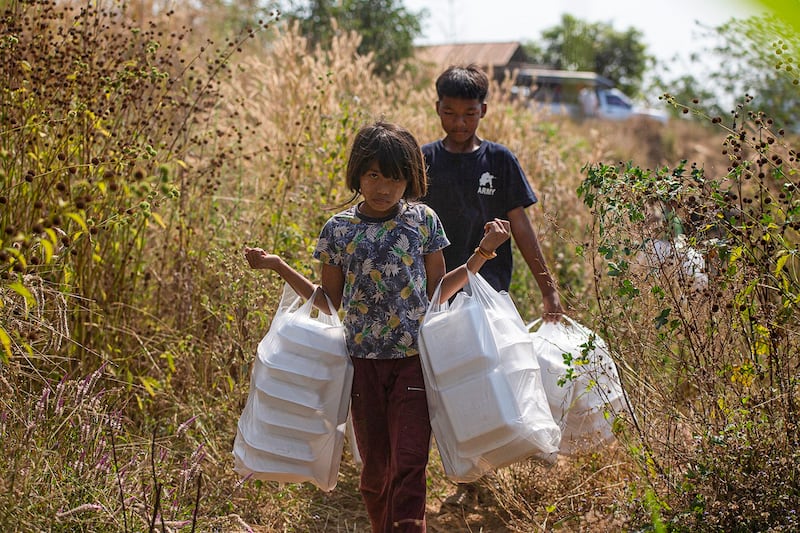[ Read RFA coverage of this story in Burmese Opens in new window ]
Updated Sept. 20, 2024, 01:25 a.m. ET
More than 30,000 people are in urgent need of aid in eastern Myanmar’s Kayah and neighboring Shan states after being inundated by Asia’s worst storm of the year, but volunteers say the country’s junta is blocking the delivery of relief items and donations.
Typhoon Yagi brought heavy rain to the region early last week, causing rivers to overflow their banks and triggering deadly flash floods and runoffs that on Monday the U.N. Office for the Coordination of Humanitarian Affairs said have affected more than 630,000 people.
Flooding killed more than 300 people and left at least 200 others missing, local media reported on Thursday, though some relief workers fear the toll will be higher. The typhoon destroyed more than 2,000 houses, more than 1,000 schools, nearly 370 religious buildings and more than 640,000 acres of farmland.
Volunteer workers told RFA Burmese that more than 30,000 people – including residents and those displaced by conflict in the aftermath of the military’s February 2021 coup d’etat – in Loikaw, Demoso, Shar Taw, Hpasawng, and Hpruso townships in Kayah state, as well as Pekon township in southern Shan state, are urgently need relief aid.
However, the junta has restricted the delivery of relief items under the pretext that they are going to rebel groups.
A relief worker in Kayah state said that their team had to turn back when junta forces in Loikaw prevented them from accessing flood-affected areas.
“We were stopped at the entrance gate to Loikaw city,” said the worker who, like others interviewed for this report, spoke to RFA on condition of anonymity due to security concerns. “Junta forces from Light Infantry Battalion 530 are stationed at this checkpoint, causing many aid groups to retreat,” he said.
As a result, flood victims have yet to receive local and international relief aid, he added.
These areas are under the control of the ethnic Karenni Nationalities Defence Force and Karenni Army, and the junta had previously banned the delivery of food there, causing residents increased hardship amid the flooding.
RELATED STORIES
[ Myanmar’s flood death toll rises to 226 with scores missingOpens in new window ]
[ Red Cross chief calls for greater aid access after visit to Myanmar Opens in new window ]
[ Floods swamp Myanmar’s capital, stranding thousands in typhoon’s aftermathOpens in new window ]
[ Scores killed by Asia’s most powerful storm of the yearOpens in new window ]
In Bago region, which lies to the southwest of Kayah state, more than 20,000 residents from over 100 villages along the eastern bank of the Sittaung River are also facing difficulties and are in need of relief, aid workers said.
But evacuations have been hampered by junta restrictions, residents said.
RFA tried to contact junta spokesperson Major Gen. Zaw Min Tun and the Ministry of Social Welfare, Relief and Resettlement for comment on the situation, but received no response.
Donor payments blocked
To compound matters, aid distributors are reporting that bank accounts using Myanmar’s KBZ Pay mobile payment system to transfer funds for flood relief had been blocked as of Tuesday.
Some people who have collected donations for flood victims told RFA they received notifications that their accounts had been temporarily suspended under Myanmar’s Anti-Money Laundering Law.
“In the note section of the transfers, they [the donors] wrote 'for the flood,'” said one woman whose account was blocked. “As a result, my account was closed … with over 7 million kyats (US$3,335) remaining in it. I can no longer receive donations or transfer money to other accounts."
The woman, who also declined to be named, said she was forced to post a message to Facebook asking that donors stop sending money to assist with flood relief.
Since the military coup, the junta has tightened monitoring of internal payment systems to prevent funds from being directed to rebel forces.

According to RFA's inquiries, at least five accounts belonging to flood relief workers and distributors have been closed, although it remains unclear how many have been affected nationwide.
When RFA contacted the KBZ call center for clarification regarding the restricted KBZ Pay accounts, representatives stated they were “not authorized to comment.”
On Tuesday, the Special Advisory Council for Myanmar called on neighboring countries "to open their borders and allow international aid to cross into Myanmar and be distributed to people in need in coordination with Myanmar resistance authorities and civil society." Donors must ensure aid reaches those most in need and is not "instrumentalized" by the junta, the group said.
But aid workers say the junta continues to obstruct flood aid in areas controlled by the armed opposition, citing military operations as the reason.
Updated to correct citation of Special Advisory Council for Myanmar statement.
Translated by Aung Naing and Kalyar Lwin. Edited by Joshua Lipes and Malcolm Foster.
